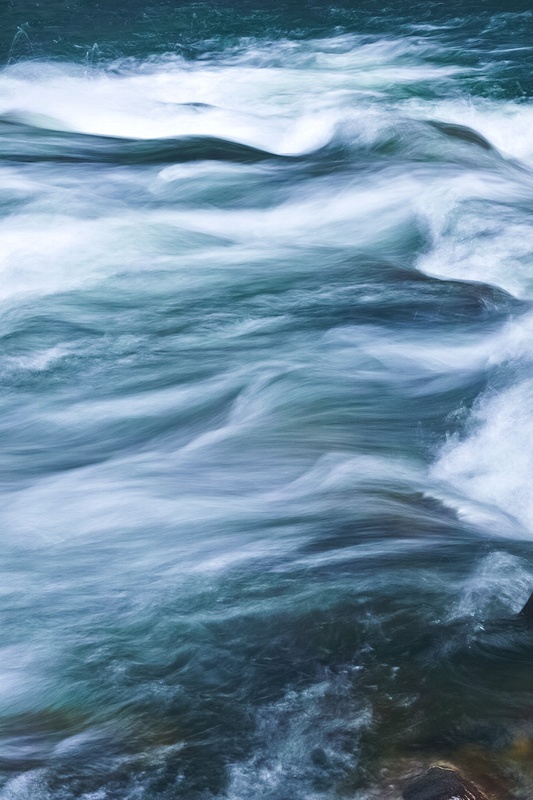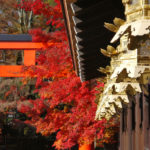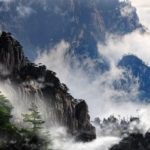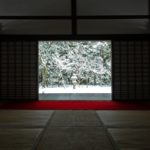With its variability and frailty, what do you compare life to? Let’s look into the opening of “Diary from a Cabin” by Kamo no Tchomay, which is one of the most famous prose in Japanese literature.
気まぐれではかない人生、何になぞらえてみたらいいのか?日本文学の中で最も有名な散文の一つである、鴨長明の「方丈記」の冒頭を考えてみましょう。
行く河の流れは絶えずして、しかも、もとの水にあらず。淀みに浮かぶうたかたは、かつ消え、かつ結びて、久しくとどまりたる例なし。世の中にある、人と栖と、またかくのごとし。・・・朝に死に、夕べに生まるるならひ、ただ、水の泡にぞ似たりける。
Rivers never cease to flow and never stay the same. Even where the water looks stagnant, the bubbles rise, form and disappear with no exception. Nothing stays the same even in human society – man and his home… One is to die in the morning. Another is to be born in the evening. Everything is in an ever-changing flow of birth and death.
– Kamo no Tchomay Diary from a Cabin河の流れは止まることがない。そのうえ、滔々と流れ来る水によって、もとのままでいることもない。淀みであっても、水の泡が浮かんでは消えていく。決して一所に留まることはない。人の世であっても、変化は絶え間ないものだ。[中略]朝に誰かが亡くなったかと思うと、夕べにはまた誰かが生まれてくる。この世のことわりは、水の泡によく似ている。
Another striking characteristics of Japanese traditional sensitivity – or mentality – is based on the idea of impermanence of all things, meaning that everything is inconsistent, variable and shifting. The misunderstanding sometimes arises that the shifting nature of life inevitably leads to helplessness, transience and frailty of life. But the idea of impermanence involves a deeper insight into life.
日本古来の感受性(精神性とも言えますが)を表すものに、「無常」という考えがあります。すべては、移り変わりやすく、一定でなく、変化し続けるという考えです。ときに誤解されるのは、移ろいやすい人生は結局、意味もなく、はかなく、空しいという考え方です。しかし、「無常」はより深い見方ができるのです。
Japan is a country exposed to risks of numerous natural disasters; there are so many earthquakes, typhoons and floods. Kamo no Tchomay himself experienced catastrophic droughts and earthquakes, destructive fires and political turbulence. Some people might think that it is a fate, that there is nothing we can do about it, but he looks into urban policies and political measures and doubts that kind of mentality.
日本は、地震や台風、水害など多くの自然災害にさらされてきました。鴨長明自身も悲惨な飢饉や地震、大火事や政治的混乱を経験しました。人は、これは運命だとか、仕方ないと考えたりもします。しかし、都市政策や災害対策も見つめ、彼は違った考えを持っています。
Kamo no Tchomay, after his retreat from aristocracy, moved his meager belongings to a hermitage cabin in the outskirt of Kyoto and wrote Diary from a Cabin. He can be compared to Henry David Thoreau, who also lived in solitude in the woods.
鴨長明は、貴族社会を離れたのち、限られた家財と共に京都近郊の庵に移り住み、「方丈記」を著しました。同じように森の孤独の中に生きたヘンリー・ディヴィット・ソーローになぞらえることもできるでしょう。
He says you can put yourself in any frame of mind. What he looks at in awe is not only each natural fluctuation but the need to resign ourselves to a bigger fabric of life. Calamities happen for no reason. Asking why is useless. Things just happen. Your wish will be dispelled; your hope crushed. You never live up to expectations; you never escape from nagging uneasiness. Too grim, demoralizing? No, it’s no pessimistic world view; rather, it’s open to opportunities once you peacefully accept disappointments. Life is once strong but fragile next moment. The link between the metaphor of stream and its bubbles and the idea of recurrent birth and death represents this idea well. Stop clinging to what you believe you should do. Let life flow.
心の持ちようによって何とでもなると鴨長明は言います。彼が深く見つめているのは、個々の災害だけでなく、より大きく人生を捉えることの必要性です。災難は理由なく降りかかり、何故と理由を尋ねても意味がない。そういうこともあるのだと。願いは所詮叶わず、希望は潰されるのがオチ。期待には応えられないし、心はずっとチクチクしたまま。暗すぎて、やる気をなくしそう?いいえ。この見方は悲観的ではなく、むしろその逆で、失望を穏やかに受け入れることができれば、可能性が開けてくるのです。人生は力強いときもあれば、あっという間にか弱くもなる。河の流れと水の泡の比喩を、繰り返される生と死とに結び付けている箇所が、その考えをよく表しています。執着を捨て、人生の流れのままに。






